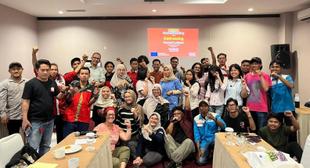Training in Thailand and Indonesia raises awareness of forced labour
As part of the ElectroPower project, Electronics Watch has delivered training sessions to migrant workers, trade union organisers and civil society representatives in Thailand and Indonesia. Jointly organised with IndustriALL South East Asia, IndustriALL local affiliates, and monitoring partners, the Labour Rights Foundation (LRF) and Inkrispena, the training focused on understanding and addressing forced labour.
Funded by the European Union, ElectroPower works against forced labour and towards fair and safe working conditions in the electronics industry. It focuses on workers, unions and civil society organisations in Malaysia, Indonesia, and Thailand. Omana George, Monitoring and Civil Society Engagement Manager at Electronics Watch, was in Thailand and Indonesia to deliver the trainings and build relationships with local unions and civil society organisations.
The first workshop in Thailand in September was aimed at migrant workers at five different electronics factories. It was held in Phetchaburi close to the areas where workers live and work. The full-day session enabled migrant workers to recognise different forms of forced labour, from warning signs like deceptive recruitment practices and employers confiscating their identity documents, to debt bondage and work done under threat.
The training covered workers' rights and the legal protections available to them in Thailand, including the right to join or form a union. Omana also explained how migrant workers can use the Electronics Watch worker-driven methodology to raise issues and achieve remedy.
Workshops in central Thailand's Chachoengsao province, and Palu in Central Sulawesi province, Indonesia, covered understanding of forced labour and how to effectively use public procurement leverage to address grievances. Both brought together civil society organisations and trade union representatives, enabling them to develop joint strategies and build capacity to address forced labour in the electronics industry. While the Thailand sessions focused on electronics production, the Indonesia workshop explored nickel smelting as a key part of the electronics supply chain.
The ElectroPower research team also met in Indonesia to discuss forced labour in nickel smelting and processing, in Jakarta, before joining the training in Palu. The research team includes Olga Martin-Ortega, Professor Hari Nugroho, Ruth Indiah Rahayu and Wasi Gede.
ElectroPower will run until 2028, supporting organising efforts in the three countries and strengthening collaboration between national and global trade unions and local civil society organisations. Electronics Watch's role focuses on reinforcing worker driven monitoring and remediation through public procurement leverage.
This article has been produced with the financial assistance of the European Union. The contents of this page are the sole responsibility of Electronics Watch and can under no circumstances be regarded as reflecting the position of the European Union.



